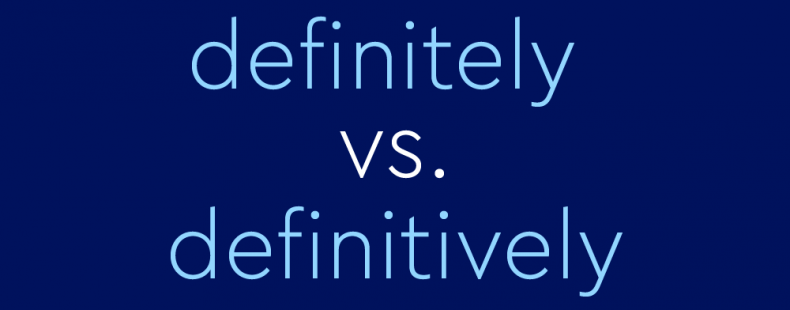You’ve received the award of a lifetime, and you’ve been asked to attend a fancy presentation dinner. You want to convey your interest in the event and are ready to respond, “Yes, I’ll definitely be there!” But wait … should you say you’re planning to definitively be there? Which is it? Definitely or definitively? Before you move on to picking out your entree and getting all dressed up, you’ve got to make a crucial word choice.
Which one do you use?
What does definitely mean?
Definitely is an adverb that expresses certainty without doubt and is defined as “in a clear and definite manner; unambiguously.” For example, you might say: I’m definitely going to the movies with you tonight. Or, you could use definitely this way: She’s definitely the funniest in our class. In this way, definitely functions like the word absolutely; there’s something that’s certain–whether you want it, need it, or just perceive it, it strikes you as very true.
Definitely can also be used to intensify a verb. In this case, it precedes the verb it modifies: I definitely want to paint the walls this afternoon. Or you could say, He definitely ate the last piece of pie.
Lastly, definitely can also be used as an interjection to express complete agreement or strong affirmation as a single-word response: Do you want to come with me on a free trip I won? Definitely!
Definitely was first recorded in 1575–85, and it adds the suffix -ly to the adjective definite (from the Latin term dēfīnītus). Synonyms for definitely include absolutely and certainly.
What does definitively mean?
Definitively is the adverb form of definitive, and it means “in a way that is definite, complete, final, or absolute.” Slightly different from definitely, definitively conveys that something is clear and unambiguous but in a conclusive, final way. For example: I can’t yet definitively say that the author’s book will sell well, but I’ve got a hunch. This is a major way definitely differs from definite. In this sentence, it is implied there is a way to know definitively (eventually, the sales data will confirm the hunch), and that’s how definitively differs from definitely—definitively suggests there can be a final, official say in the matter.
The adverb definitively was first recorded around 1350–1400 and is also based on dēfīnītus. Synonyms for definitively include completely, absolutely, and ultimately.
The first definition listed for definitely (“in a clear and definite manner; unambiguously”) is the one most likely to be confused with definitively.
How to use definitely and definitively
Definitely and definitively can be tricky to keep straight because of their similar spellings and meanings related to certainty. However, definitively is typically used to express the final or ultimate aspect while definitely tends to be used for emphasis. Definitively has a more concrete, finite, and official connotation.
Examples of definitively include:
- Without all the evidence, we can’t definitively say this man is guilty. (In this example, there is something missing—incomplete—that prevents the guilt from being definitive, or complete.)
- The couple dated long distance for many years but definitively parted when Jonas moved overseas.
- Writer Michelle McNamara was dedicated to finding out who the Golden State Killer was but unfortunately, she died before his identity was definitively known.
However, definitely although still certain, relies less on real-world evidence. Examples of definitely include:
- Despite always being late, she promised to definitely be on time for the wedding.
- Forget what I said about my diet, I could definitely go for some ice cream right now.
- Are you free to hang out tomorrow? Yes, definitely!
So back to our imaginary scenario: go ahead and answer “Yes, I’ll definitely be there,” and enjoy all the awards and accolades you deserve, you fantastic wordsmith!














